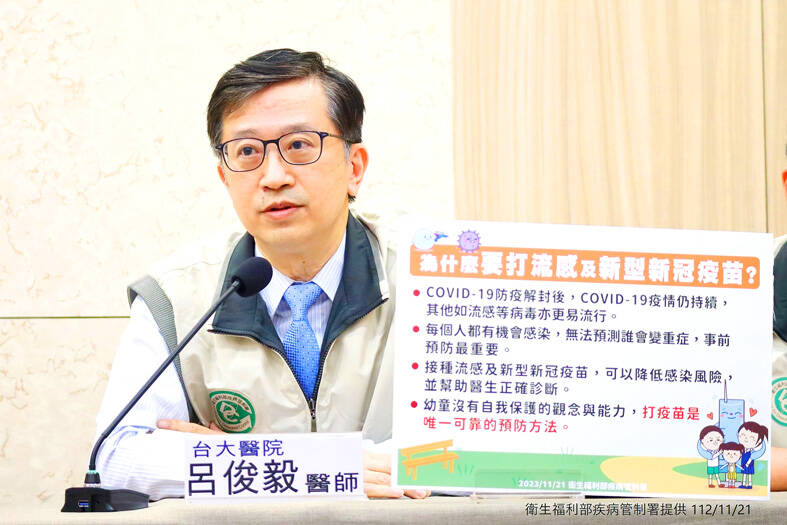Preschool-age children are more at risk of developing severe complications from the flu, so parents are advised to get them vaccinated, the Centers for Disease Control (CDC) said yesterday, while announcing that five flu-related deaths and 23 cases of severe flu complications were reported last week, including two children who experienced altered consciousness.
CDC Epidemic Intelligence Center Director Guo Hung-wei (郭宏偉) said there were 56,049 hospital visits for flu-like illnesses last week, down from the week before, but still higher than the same week over the past few years.
All of the five people who died last week had underlying health conditions, and none had been vaccinated against the flu this season, Guo said, adding that 23 cases of severe flu complications were also reported, including 21 people who had not been vaccinated.

Photo courtesy of the Centers for Disease Control
CDC physician Lin Yung-ching (林詠青) said the youngest of the severe flu cases was a seven-year-old boy who did not have a chronic health condition and had not been vaccinated.
He had a fever, runny nose and phlegm, and suddenly developed altered consciousness the next day, so was taken to hospital, where he was treated in intensive care for six days, Lin said.
The boy had an influenza A infection with encephalitis and pneumonia, he said, adding that he has returned home.
Another serious case was a 13-year-old boy with no underlying health conditions who had not been vaccinated, Lin said.
The teen had a fever and vomiting early this month, but although the symptoms disappeared, he gradually developed respiratory problems and was diagnosed with influenza A, he said.
Although he took antivirals, he began experiencing anxiety, dependency, personality changes, drowsiness and his leg began twitching, Lin said, adding that the teen’s doctor diagnosed him as having acute encephalopathy, and he has been hospitalized.
National Taiwan University Hospital pediatrician Lu Chun-yi (呂俊毅) said encephalopathy linked to influenza is not common, but it is usually serious, and as there is no way to predict who is prone to it, getting vaccinated is the best precaution.
Children who contract the flu usually have a fever for two to three days, as well as fatigue and respiratory symptoms, he said.
However, if they develop shortness of breath, panting or wheezing, they might have pneumonia, or if they develop altered consciousness, are sleepy and unable to wake up, or their personality changes, they might have encephalopathy, and should seek immediate medical attention, Lu said.
As temperatures are dropping, many viruses are circulating in local communities, and most young children do not properly protect themselves against them, Lu said, adding that getting vaccinated is the best way to avoid infection and allows doctors to make an accurate diagnosis faster.
CDC Deputy Director-General Tseng Shu-hui (曾淑慧) said that since the government-funded flu vaccination program started last month, more than 5.54 million doses had been administered as of Monday.
However, among children aged six months to six years the vaccination rate is only 50.9 percent, Tseng said.
Meanwhile, the COVID-19 situation was previously forecast to peak late next month, but the CDC now expects it to peak in middle-to-late January, she added.

POLAM KOPITIAM CASE: Of the two people still in hospital, one has undergone a liver transplant and is improving, while the other is being evaluated for a liver transplant A fourth person has died from bongkrek acid poisoning linked to the Polam Kopitiam (寶林茶室) restaurant in Taipei’s Far Eastern Sogo Xinyi A13 Department Store, the Ministry of Health and Welfare said yesterday, as two other people remain seriously ill in hospital. The first death was reported on March 24. The man had been 39 years old and had eaten at the restaurant on March 22. As more cases of suspected food poisoning involving people who had eaten at the restaurant were reported by hospitals on March 26, the ministry and the Taipei Department of Health launched an investigation. The Food and

The long-awaited Taichung aquarium is expected to open next year after more than a decade of development. The building in Cingshui District (清水) is to feature a large ocean aquarium on the first floor, coral display area on the second floor, a jellyfish tank and Dajia River (大甲溪) basin display on the third, a river estuary display and restaurant on the fourth, and a cafe and garden on the fifth. As it is near Wuci Fishing Port (梧棲漁港), many are expecting the opening of the aquarium to bring more tourism to the harbor. Speaking at the city council on Monday, Taichung City Councilor

A fourth person has died in a food poisoning outbreak linked to the Xinyi (信義) branch of Malaysian restaurant chain Polam Kopitiam (寶林茶室) in Taipei, Deputy Minister of Health and Welfare Victor Wang (王必勝) said on Monday. It was the second fatality in three days, after another was announced on Saturday. The 40-year-old woman experienced multiple organ failure in the early hours on Monday, and the family decided not to undergo emergency resuscitation, Wang said. She initially showed signs of improvement after seeking medical treatment for nausea, vomiting and diarrhea, but her condition worsened due to an infection, he said. Two others who

Taiwanese should be mindful when visiting China, as Beijing in July is likely to tighten the implementation of policies on national security following the introduction of two regulations, a researcher said on Saturday. China on Friday unveiled the regulations governing the law enforcement and judicial activities of national security agencies. They would help crack down on “illegal” and “criminal” activities that Beijing considers to be endangering national security, according to reports by China’s state media. The definition of what constitutes a national security threat in China is vague, Taiwan Thinktank researcher Wu Se-chih (吳瑟致) said. The two procedural regulations are to provide Chinese